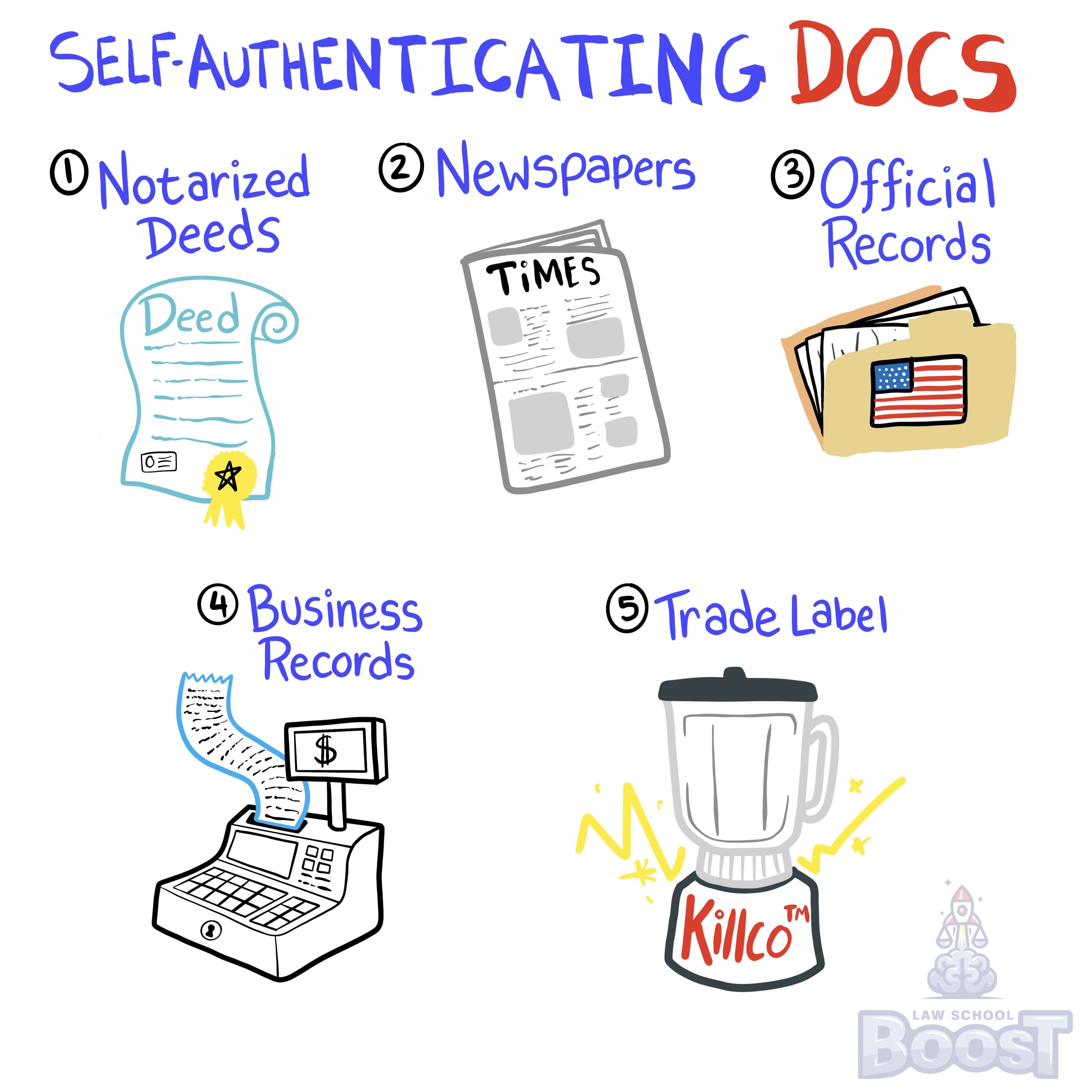🦅
Federal Evidence • Documentary Evidence
EVID#104
Legal Definition
Self-authenticating documents include: (1) notarized documents; (2) newspapers; (3) official records; (4) business records; (5) trade labels
Plain English Explanation
Normally, when you want to use a document in court, you have to prove it’s genuine, which means showing it’s not fake or tampered with. However, there are some documents that are so generally trusted that the court just assumes they are real unless someone has a strong reason to doubt them. These are called self-authenticating documents. Commonly tested examples include:
(1) Notarized documents: These have been officially stamped by a notary who confirms the identities of the people signing.
(2) Newspapers: These are considered reliable records of daily events.
(3) Official records: Documents created by government agencies are trusted because they follow strict protocols.
(4) Business records: Companies keep regular records of their operations, like sales or employee information, which are trusted if they’re made normally and regularly.
(5) Trade labels: Information on product labels, like ingredients or manufacturer details, are assumed to be correct.
(1) Notarized documents: These have been officially stamped by a notary who confirms the identities of the people signing.
(2) Newspapers: These are considered reliable records of daily events.
(3) Official records: Documents created by government agencies are trusted because they follow strict protocols.
(4) Business records: Companies keep regular records of their operations, like sales or employee information, which are trusted if they’re made normally and regularly.
(5) Trade labels: Information on product labels, like ingredients or manufacturer details, are assumed to be correct.
Hypothetical
Hypo 1: Bob runs a business and signs a contract with Sam, which is notarized. In court, Bob presents this contract as evidence. Result: The court accepts the contract without needing further proof because it's a notarized document, which is self-authenticating.
Hypo 2: Sam sues Bob for a false claim made in a newspaper article. He brings the newspaper to court as evidence. Result: The court accepts the newspaper as genuine evidence without extra verification because newspapers are self-authenticating.
Hypo 3: Bob presents official city records in court to prove his property boundaries in a dispute with Sam. Result: The court accepts the records without needing someone to verify them, as official records are self-authenticating.
Hypo 4: In a lawsuit against Sam's company, Bob uses the company's financial records to show discrepancies. Result: The court considers these business records as reliable evidence without additional authentication.
Hypo 5: Sam buys a blender from a well-known manufacturer. After a few uses, the blender malfunctions, causing an injury to Sam. He sues the manufacturer, alleging that the blender had a defective design and lacked proper safety warnings. In court, Sam's attorney presents the blender, focusing on the trade label. This label contains the manufacturer's name, model number, safety instructions, and warning labels. Result: The court accepts the trade label on the blender as genuine evidence without needing a witness from the manufacturer to confirm its authenticity. The trade label's presence on the blender, as part of the standard manufacturing process, is sufficient for self-authentication. Thus, the court is able to consider the information on the label, including any safety warnings, as part of the evidence in assessing Sam's claims against the manufacturer.
Hypo 2: Sam sues Bob for a false claim made in a newspaper article. He brings the newspaper to court as evidence. Result: The court accepts the newspaper as genuine evidence without extra verification because newspapers are self-authenticating.
Hypo 3: Bob presents official city records in court to prove his property boundaries in a dispute with Sam. Result: The court accepts the records without needing someone to verify them, as official records are self-authenticating.
Hypo 4: In a lawsuit against Sam's company, Bob uses the company's financial records to show discrepancies. Result: The court considers these business records as reliable evidence without additional authentication.
Hypo 5: Sam buys a blender from a well-known manufacturer. After a few uses, the blender malfunctions, causing an injury to Sam. He sues the manufacturer, alleging that the blender had a defective design and lacked proper safety warnings. In court, Sam's attorney presents the blender, focusing on the trade label. This label contains the manufacturer's name, model number, safety instructions, and warning labels. Result: The court accepts the trade label on the blender as genuine evidence without needing a witness from the manufacturer to confirm its authenticity. The trade label's presence on the blender, as part of the standard manufacturing process, is sufficient for self-authentication. Thus, the court is able to consider the information on the label, including any safety warnings, as part of the evidence in assessing Sam's claims against the manufacturer.
Visual Aids

Related Concepts
How are ancient documents authenticated?
In California, how are ancient documents authenticated?
In California, what types of documents are self-authenticating?
What is he Best Evidence Rule?
What is the purpose of authentication?
What is the Secondary Evidence Rule?
When assessing the Secondary Evidence Rule, when is an original or duplicate not required?
When can someone authenticate a letter they received?
Who can authenticate a voice?


